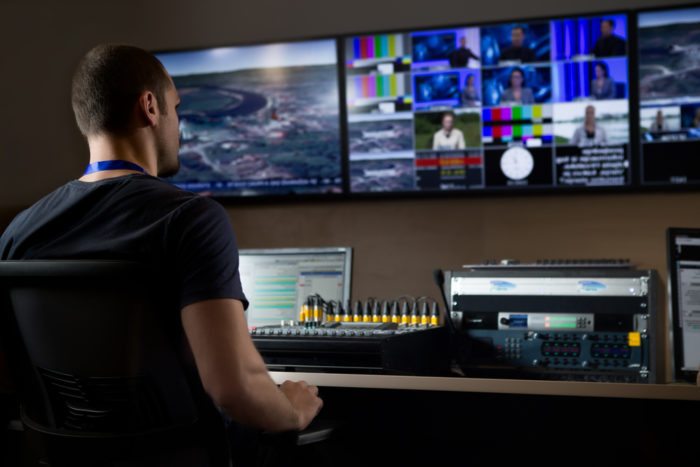Why We Love It
-
$44,050Potential Avg. Salary
-
-6.3%Job Growth Rate
-
Good Entry Level SalaryCareer Attribute
-
InvestigativeCareer Attribute
Broadcast engineers set up and maintain equipment used in broadcast distribution for radio and television stations. They conduct maintenance on and oversee the functionality of equipment used for transmitting broadcasts, such as radio towers, computer networks, and radio-frequency technology.
Recommended Schools
What is a Broadcast Engineer?
The following job responsibilities are common for individuals in broadcast engineer roles:
- Set up and maintain automated broadcasting equipment and transmittal technology systems
- Troubleshoot and resolve broadcast transmittal issues, such as radio frequency interference
- Ensure the proper regulation of signal strength, sound quality, and picture quality for television networks and radio stations
- Utilize software programs designed to troubleshoot, optimize, and monitor broadcast systems
A Day in the Life
Broadcast engineers are the professionals behind ensuring the public has access to its favorite television programs and radio stations. They are responsible for setting up and maintaining the systems used in the transmitting of broadcasts, including the quality of sound and picture and the signal strength. Broadcast engineers specialize in several different areas of engineering, including electrical engineering, radio frequency (RF) engineering, and computer engineering.
Often, broadcast engineers work for a specific news station and handle all broadcast engineering tasks for that station. This requires work both within the station and outside of the station at transmitter plants or radio towers. Broadcast engineers perform maintenance and troubleshooting tasks at all relevant structures to ensure the quality and availability of programs filmed both at the station and from remote locations.
Broadcast engineers may focus broadly on all tasks related to transmitting broadcasts, or they may focus on a more specialized subset of responsibilities. For example, some broadcast engineers focus specifically on audio engineering and are concerned with the quality of sound for broadcasts. They may work to improve sound quality or sync up audio images with video images. Others may focus on radio frequency engineering, specializing in the optimal transmittal of radio waves for networks and stations.
Typical Work Schedule
Most broadcast engineering roles are full-time, though working schedules may vary greatly by employer. Broadcast engineers often need to be available during all shifts, including evenings and overnight, and may need to work holidays and weekends to keep broadcasts running efficiently. Additionally, overtime may be required to handle emergency issues or meet deadlines.
Broadcast Engineering Specializations
- Audio engineers specialize in optimizing the sound quality of radio and television broadcasts.
- Radio frequency engineers specialize in maintaining radio frequency equipment, avoiding frequency interference disruptions, and ensuring signal strength.
- Video engineers specialize in optimizing the picture quality of radio and television broadcasts.
Typical Employers
Most broadcast engineers are employed by radio and television broadcasting networks and stations. In smaller media markets, broadcast engineers may be self-employed and contract with radio and TV stations on a freelance basis. Some broadcast engineers may also be employed by movie studios, sound recording studios, or other entertainment providers.
Recommended Schools
How To Become a Broadcast Engineer
Many aspiring broadcast engineers begin their careers as technicians, assisting engineers with the maintenance of certain types of broadcast equipment or technology. To work as a technician, a high school diploma may be sufficient, though many choose to pursue a postsecondary certification. There are many types of certificate programs available that teach aspiring broadcast engineers the tools of the trade, including audio technician, video technician, or radio frequency technician certifications.
While working as a technician can offer professional experience—and pay—in your career field, to earn the role of broadcast engineer, you’ll need to have a bachelor’s degree. Depending on which school you choose, you may even be able to apply credits from certificate programs toward earning a bachelor’s degree. The degree you pursue is somewhat flexible. Broadcast engineers may major in electrical, electronic, telecommunication, or computer engineering, or they may major in broadcast technology.
After earning a degree, many broadcast engineers choose to pursue additional certifications from the Society of Broadcast Engineers. While these certifications are not necessarily required by employers, they can improve a candidate’s chances of being hired for open roles. Certification typically requires candidates to earn a number of hours of professional experience in the field, and to pass a written exam. Additionally, continuing education may be required to maintain certifications.
Broadcast Engineer Salary Data
We’ve provided you the following to learn more about this career. The salary and growth data on this page comes from recently published Bureau of Labor Statistics data while the recommendations and editorial content are based on our research.
National Anual Salary
Low Range
$24,940Average
$44,050High Range
$79,260National Hourly Wage
Low Range
$12/hrAverage
$21/hrHigh Range
$38/hrHow do Broadcast Engineer salaries stack up to other jobs across the country? Based on the latest jobs data nationwide, Broadcast Engineer's can make an average annual salary of $44,050, or $21 per hour. This makes it an Above Average Salary. On the lower end, they can make $24,940 or $12 per hour, perhaps when just starting out or based on the state you live in.
Salary Rankings And Facts
#466 Nationally for All Careers
Programs and Degrees
Here are the most common degrees for becoming a Broadcast Engineer. a is usually recommended and specifically a degree or coursework that prepares you for the particular field, see below.
Highest Education Among Broadcast Engineers
- 0.6% Doctorate
- 3.8% Masters
- 32.9% Bachelors
- 16.2% Associates
- 28.4% College
- 14.8% High School
- 3.1% Less than High School
Job Growth Projections and Forecast
2014 Total Jobs
30,1002024 Est. Jobs
28,200Job Growth Rate
-6.3%Est. New Jobs
-1,900How does Broadcast Engineer job growth stack up to other jobs across the country? By 2024, there will be a change of -1,900 jobs for a total of 28,200 people employed in the career nationwide. This is a -6.3% change in growth over the next ten years, giving the career a growth rate nationwide of Below Average.
Growth Rankings And Facts
#718 Nationally for All Careers
What Companies Employ The Most Broadcast Engineers
| Industry | Current Jobs | New Jobs Needed | % Increase |
|---|---|---|---|
| Television broadcasting | 12,100 | -900 | -1% |
| Radio broadcasting | 7,200 | -1,400 | -1% |
| Self-employed workers | 2,700 | --- | --- |













